Student loan debt is one of the major barriers facing first-time homebuyers to qualify for a mortgage. In 2020, 51% of all buyers said that student loans delayed their ability to save for a down payment or save for their home purchase, according to the 2020 Home Buyers and Seller Generational Trends report.
The burden of student loan debt often affects an applicant’s debt-to-income ratio and contributes to a low credit score, the two top reasons for mortgage application denial in 2020.
FHA, VA, USDA, Fannie Mae and Freddie Mac (Conventional) loan guidelines evaluate student loan debt differently, so the DTI ratio will be different for each loan program.
For example, Freddie Mac uses 0.5% of the outstanding student loan balance to calculate a monthly payment amount for a mortgage application. For student loans in deferment, Fannie Mae calculates $0 towards DTI, and Freddie Mac calculates 0.5% of the principal balance. Until recently, FHA mortgages took 1% of the total student debt balance to calculate DTI, so $50,000 in total student loan debt would be calculated as $500 towards DTI.
Fortunately, FHA eligibility guidelines have recently loosened. New FHA guidelines released on June 19th should make it easier for your clients to get approved for an FHA mortgage.
FHA mortgages now take the homebuyer’s monthly student loan payment amount into the DTI calculation. If the homebuyer has a $0 monthly payment or their loans are in forbearance/default, FHA uses 0.5% of the total student debt balance. That $50,000 student loan debt would now be calculated as $250 towards DTI, freeing up an extra $250 per month in affordability for a home purchase.
While Fannie Mae might still appear to be the better loan program for homebuyers with student loan debt, there are other factors to consider. FHA loans could still be better for your homebuyer because they accept a higher DTI ratio and a slightly lower credit score requirement.
If this all sounds rather complicated, FinLocker has partnered with LoanSense to help your homebuyers lower their student loan payments, thereby increasing their purchasing power to qualify for a higher mortgage loan. They specialize in knowing how student debt affects mortgage products, so they can also advise mortgage originators on the best loan program for that homebuyer. Use the free LoanSense calculator to see how the program can help your homebuyers.
Homebuyers who need more assistance to get mortgage-ready will benefit from the tools and resources in the FinLocker app. Since the start of the year, the team has diligently worked to enhance the tools and user experience. Click here to watch an online demo or schedule a live demo of the FinLocker app.




